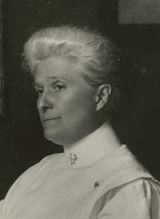Anna Maxwell
Anna Caroline Maxwell (March 14, 1851 – January 2, 1929), often referred to as "the American Florence Nightingale," was a pioneering nurse and educator who played a significant role in the development of modern nursing practices in the United States. Her contributions to nursing education and her efforts in the establishment of quality nursing practices have left a lasting legacy in the healthcare field.
Early Life and Education[edit | edit source]
Anna Maxwell was born in Bristol, New York, to a family with a strong military background that influenced her later work in military nursing. She pursued her initial education in nursing at the Boston City Hospital Training School for Nurses, graduating in 1878. Maxwell's early career was marked by a dedication to improving nursing standards and education.
Career and Contributions[edit | edit source]
Maxwell's career in nursing education took a significant step forward when she was appointed as the superintendent of the Boston Training School for Nurses at Massachusetts General Hospital in 1880. Her tenure there was marked by substantial reforms in the nursing curriculum, emphasizing a more structured and scientific approach to nursing education.
In 1892, Maxwell played a pivotal role in the establishment of the nursing school at Presbyterian Hospital in New York City, which later became part of Columbia University. As the school's first director, she developed a comprehensive nursing program that included both theoretical instruction and practical training. Under her leadership, the school introduced one of the first university-based nursing education programs in the United States, setting a precedent for future nursing education standards.
Maxwell's contributions were not limited to education. She was instrumental in organizing the Army Nurse Corps during the Spanish-American War, advocating for the professionalization of military nursing. Her efforts helped improve the care of soldiers and paved the way for the formal recognition of military nurses.
Legacy[edit | edit source]
Anna Maxwell's legacy in nursing and healthcare is profound. She was a key figure in the movement towards professionalizing nursing, emphasizing the importance of education, training, and scientific knowledge in the field. Her work has influenced countless nurses and healthcare professionals, and her contributions to military nursing have been particularly impactful.
Maxwell's dedication to nursing education and her efforts to improve healthcare standards have earned her a place among the most influential figures in the history of nursing. The Anna C. Maxwell Award, established in her honor, recognizes outstanding contributions to nursing education and practice.
Death and Recognition[edit | edit source]
Anna Maxwell died on January 2, 1929, leaving behind a legacy of innovation and leadership in nursing. She was posthumously inducted into the American Nurses Association Hall of Fame, acknowledging her significant contributions to the nursing profession.
Search WikiMD
Ad.Tired of being Overweight? Try W8MD's physician weight loss program.
Semaglutide (Ozempic / Wegovy and Tirzepatide (Mounjaro / Zepbound) available.
Advertise on WikiMD
|
WikiMD's Wellness Encyclopedia |
| Let Food Be Thy Medicine Medicine Thy Food - Hippocrates |
Translate this page: - East Asian
中文,
日本,
한국어,
South Asian
हिन्दी,
தமிழ்,
తెలుగు,
Urdu,
ಕನ್ನಡ,
Southeast Asian
Indonesian,
Vietnamese,
Thai,
မြန်မာဘာသာ,
বাংলা
European
español,
Deutsch,
français,
Greek,
português do Brasil,
polski,
română,
русский,
Nederlands,
norsk,
svenska,
suomi,
Italian
Middle Eastern & African
عربى,
Turkish,
Persian,
Hebrew,
Afrikaans,
isiZulu,
Kiswahili,
Other
Bulgarian,
Hungarian,
Czech,
Swedish,
മലയാളം,
मराठी,
ਪੰਜਾਬੀ,
ગુજરાતી,
Portuguese,
Ukrainian
Medical Disclaimer: WikiMD is not a substitute for professional medical advice. The information on WikiMD is provided as an information resource only, may be incorrect, outdated or misleading, and is not to be used or relied on for any diagnostic or treatment purposes. Please consult your health care provider before making any healthcare decisions or for guidance about a specific medical condition. WikiMD expressly disclaims responsibility, and shall have no liability, for any damages, loss, injury, or liability whatsoever suffered as a result of your reliance on the information contained in this site. By visiting this site you agree to the foregoing terms and conditions, which may from time to time be changed or supplemented by WikiMD. If you do not agree to the foregoing terms and conditions, you should not enter or use this site. See full disclaimer.
Credits:Most images are courtesy of Wikimedia commons, and templates Wikipedia, licensed under CC BY SA or similar.
Contributors: Prab R. Tumpati, MD

